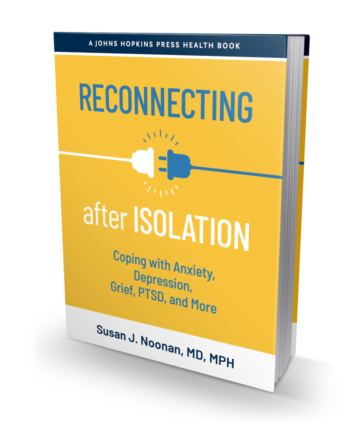The COVID-19 worldwide health crisis has had a major impact on us medically, socially and economically, with significant disruption to our lives and daily routines. It is a cause of monumental stress, newfound fear, and anxiety in many, including:
- fear of the unknown;
- fear of contracting the virus ourselves and in loved ones, with uncertain and potentially fatal outcomes;
- concerns about insufficient access to both routine and urgent health care, treatments, procedures, medications and resources;
- loneliness due to social isolation and physical separation;
- fear and anxiety related to erratic changes in our economy, job losses, and diminishing personal financial resources.
The nearly continuous media coverage magnifies our fears, especially when varied, uncertain, rapidly changing, or contradictory information is circulated.
These concerns are more profound in the approximately 25 million adults and adolescents in the United States who experience a mood disorder such as depression or bipolar disorder each year. Most of the life changes that accompany the COVID-19 crisis have a negative effect on depression, our ability to manage it, and the stabilizing factors in our lives that support our emotional health. They include:
- social isolation with limited in-person human contact, including mental health clinicians and peer support groups;
- lack of routine, structure and purpose in the endless days of confinement;
- variations in routine sleep, dietary and exercise habits;
- new sources of major stress and uncertainty;
- increased anxiety, which already occurs in 50 % of those who have depression.
It’s an extraordinary challenge that requires major effort by people who already have a mood disorder diagnosis and are in treatment, by the undiagnosed who are without treatment, and by those experiencing first-time depression (due to COVID-related stressors) who lack the skills to manage their illness. These concerns are equally valid in people who have essential jobs and are still working; employees working from home; individuals who have recently lost a job and are struggling to obtain unemployment benefits; parents/family caring for children and seniors; and those who live alone.
Many are wondering: how can I care for myself during this self-isolation and/or quarantine period to effectively manage my depression and avoid recurrence? Please consider the following ways to deal with the symptoms of depression and anxiety during this stressful time – they do work!
Accept and adapt. Those who accept the reality of the COVID-19 pandemic and adapt to their new circumstances, while continuing with the things in life that provide meaning and purpose, have a greater chance of maintaining emotional stability.
Stay busy. Predictable and regular daily routines help to keep our body’s internal clock running smoothly, which is important to our wellbeing. Having structure, meaning and purpose is key. Try to keep up with your regular family, household, personal care and work routines and responsibilities. Focus on what’s meaningful to you. Think about different pursuits, for example: connect with others; clean and organize your home, closets or drawers; work on your hobbies and projects; or learn something new from a free online class. If you have children, remember that they’re used to routine and structure in school, homework, sports and social activities. Consistency helps them feel in control and less anxious, which in turn calms you.
Connect. Endless hours of empty alone time are not healthy for anyone. Make an effort to reach out to others, by phone or video conferencing (FaceTime, Skype, Zoom, etc.). Be creative and plan special activities, like playing a musical instrument or board game with friends over social media. I recently enjoyed a “FaceTime Brunch” with family- we prepared and ate our meal separately but together.
Use coping strategies: Humor, hobbies, pets, music, and exercise all help in managing depression. Include a relaxation routine or yoga (online or on your own) and pleasurable moments. Try to do things with family at home or with friends virtually, such as games, exercise, music, funny movies, yardwork or cooking and baking.
Care for yourself. Attend to your personal care: shower and get dressed in clean clothes instead of staying in your PJ’s or sweats all day. This truly has a positive effect on our mood.
Get regular sleep. Go to bed and get up at the same time each day, maintaining a steady sleep pattern. Staying up late or having fragmented, erratic sleep will only worsen depression symptoms. Avoid daytime naps – they interfere with nighttime sleep.
Feed your body; Feed your brain. Your brain needs fuel to operate. Eat three healthy meals at the same time each day instead of snacking or grazing all day long. This will stabilize your blood sugar, which then has a positive impact on mood and brain functioning. Ideally, enjoy your meals with another person, even if it’s virtually or on social media. Take your prescribed medications – getting a 90-day supply will decrease your anxiety about running out. Make an effort to avoid or limit alcohol, street drugs, tobacco and excess caffeine. Following these suggestions will help to diminish depression and anxiety symptoms.
Move more, sit less. Exercise is an excellent way to maintain mental and physical health. It raises the level of a chemical in your brain, BDNF, which acts like brain fertilizer to grow new brain cells and increase connections between them. During this time, try to stay physically active (as possible) and spend some time outdoors each day getting fresh air. Walk the dog; play tag with your kids; go on a fitness walk or run; steadily climb up and down two flights of stairs in your house or apartment building for 20 minutes 3x week; do stationary floor exercises like leg squats, leg lifts, jumping jacks and sit ups. Gretchen Reynolds, a NY Times journalist, has written many articles on fitness and physical health; I highly recommend The Scientific 7 Minute Workout. (https://www.nytimes.com/interactive/projects/well/workouts/ ).
Home environment and activities: Keep your home environment organized, tidy and clean. Clutter can cause you to feel uneasy and lethargic. Do the laundry, fold it, and even bring out the iron, which I’m told is a soothing ritual for some!
Stay informed. Learn about the coronavirus and its complications but limit your news exposure to one brief period twice a day, not at bedtime, to keep current in this rapidly changing environment. Get accurate facts from reliable sources and be wary of versions posted online or on social media.
Managing your illness. Mindfulness techniques that focus on the present and CBT strategies designed to address negative and distorted thoughts, inaccurate beliefs and unhelpful behaviors, often improve depression symptoms. Reach out to others through online support groups and chat rooms. DBSA and NAMI, national mental health support and educational organizations with local chapters, have recently been facilitating groups online and through Zoom.
If you have an established mood disorder diagnosis, stay in regular touch with your mental health treatment team, ideally through virtual appointments (telemedicine) on a computer or by telephone. Watch for symptoms of depression, including having at least five of the following for more than two weeks: sad, depressed or irritable mood; loss of interest or pleasure in most things; changes in your sleep, appetite, or weight; problems concentrating; thoughts of worthlessness or hopelessness; or thoughts of suicide. If depression is a new experience for you and/or you don’t have a mental health clinician, contact your family doctor for evaluation and treatment recommendations.
If you’re in crisis or having a mental health emergency, contact your provider directly. He or she will evaluate your current symptoms and determine the best course of action. If you don’t have a PCP or mental health clinician, call your hospital’s Department of Psychiatry or Emergency Department to see if they have established an outpatient urgent care clinic outside of the ER where you can be seen and evaluated. If you are suicidal, call you provider or 9-1-1 immediately for assessment and treatment.
Having depression does not mean that you will be unable to manage the stressors of COVID-19. You need to manage your illness and rely on your resilience – the ability to adapt well in the face of adversity and stress, such as this pandemic. Following the strategies I have outlined will enable you to cope more effectively and bounce back more readily from the medical, social and economic threats of the COVID-19 experience. This I know.
Stay well!
A modified version of this article appeared in Psychology Today.

